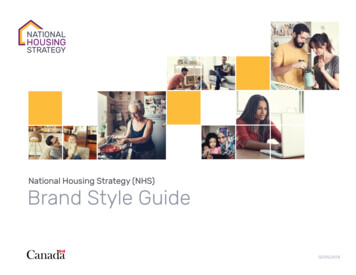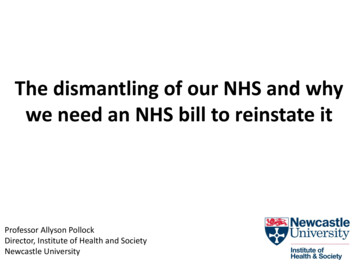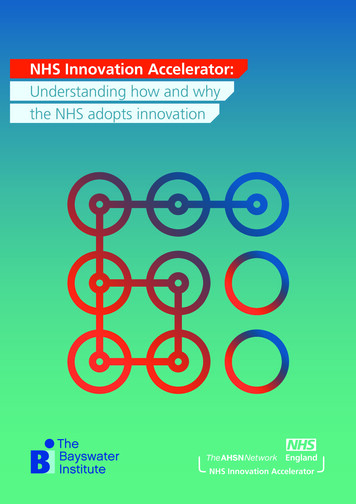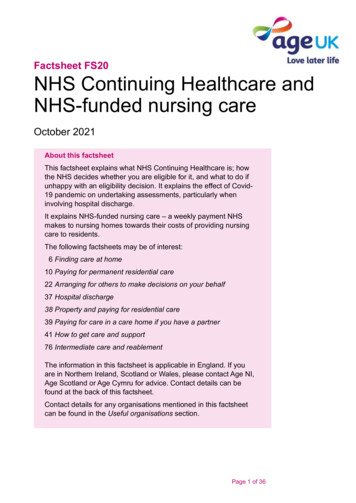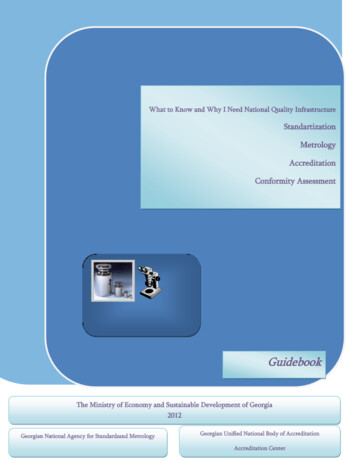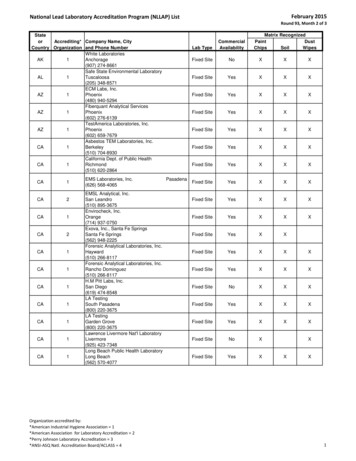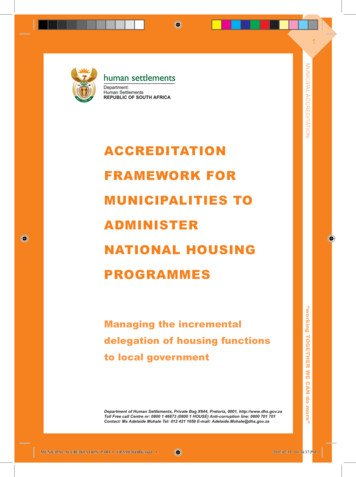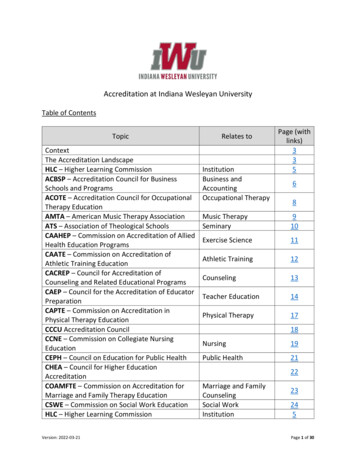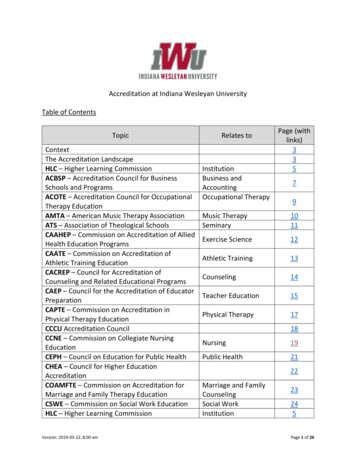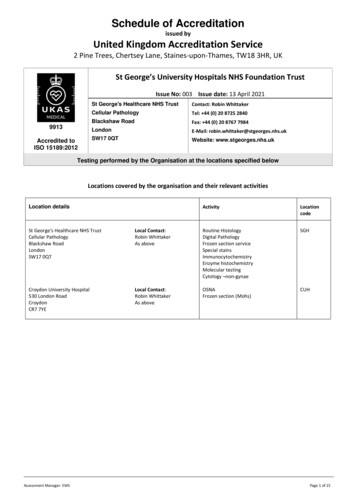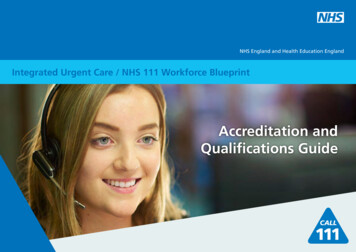
Transcription
EnglandNHS England and Health Education EnglandIntegrated Urgent Care / NHS 111 Workforce BlueprintAccreditation andQualifications Guide
H t uContentsIntroduction3Accreditation4What accreditation means4How to check whether a qualification has ‘accredited status’5Awarding bodies5Royal Colleges’/Professional Bodies’ Continued Professional Development (CPD) accreditation7How to accredit an in-house training programme7Qualifications10Different levels of qualifications10Qualification comparison gy Enhanced Learning14Sector Skills Councils and standards setting bodies17Funding19Glossary22Integrated Urgent Care / NHS 111
H t uIntroductionThis Accreditation and Qualification guide will support IntegratedUrgent Care (IUC) / NHS 111 staff, enabling them to makeinformed decisions in relation to teaching, learning and trainingwhen it comes to service provision, personal development, careerprogression and continuous professional development.This document outlines the current situation with regards toaccreditation and qualifications in England. It gives informationto providers of IUC / NHS 111 services so that they can understandand prepare themselves to meet the challenges of supporting anddeveloping their employees, thus encouraging staff retention.This guide will be helpful for managers to share with their team,so employees can be fully aware of the learning and support thatis available to them. Peer support for training is highly importantin this critical area of the NHS. This will help encourage progressionfor staff working in the Integrated Urgent Care service.Integrated Urgent Care / NHS 111This guide can be used as a tool to: Identify and map learning opportunities, e.g. apprenticeshipstandards, stand-alone qualifications to job descriptions orContinuous Professional Development (CPD), appraisal andpersonal development reviews. Identify current levels of development of all staff, supportingemployers with workforce planning through, for example,training needs analysis and succession planning. Implement apprenticeship projects. Provide a signpost for those considering other learningopportunities. Improve retention and role satisfaction within the system byoffering flexible training opportunities. Provide a framework through which accredited education andtraining can be delivered to staff at all levels; increasing theinvestment in staff development should encourage and enablecareer progression within the service.3
H t uAccreditationThis section explains what accreditation means and describes the two main regulatory bodies in England. It outlines the role of theawarding bodies and Royal Colleges/Professional Bodies in accrediting qualifications and continuing professional development courses. Inaddition, it describes the process for how an employer can set up accreditation for an in-house training programme.What accreditation meansAccreditation is the official certification that a school/college/university or a course has met standards set by external regulators.In England, the Office of Qualifications and ExaminationsRegulation (Ofqual) is a regulator of qualifications, examinationsand assessments. Ofqual’s role is to maintain standards andconfidence in qualifications. They oversee the following: GCSEsA levelsAS levelsvocational and technical qualificationsIn Higher Education, the Quality Assurance Agency (QAA) is theindependent body which checks how universities, colleges andalternative providers of UK higher education maintain theiracademic standards and quality. The Framework for HigherEducation Qualifications (FHEQ), published by the QualityAssurance Agency for Higher Education (QAA) describes thequalification levels.Universities, colleges and all training providers need to go througha process to have their qualifications accredited. For an employeror employee, when searching for an appropriate qualification, it ispossible to check whether it has achieved ‘accredited/regulated status’.Integrated Urgent Care / NHS 111
H t uHow to check whether a qualification has ‘accreditedstatus’It is possible to search the Register of Regulated Qualifications tofind out:For many awarding bodies, recognition by one of the UK regulatorswill be the appropriate quality mark for their organisation.For others it might be QAA, International Organisation forStandardisation (ISO) or oversight by a professional regulator.1 if a qualification is regulated (officially recognised)Examples of awarding bodies are shown below: what level it is on the Regulated Qualifications Framework (RQF) City and GuildsThe register includes GCSE, A level, AS level and vocational (workrelated) qualifications in England and Northern Ireland.For qualifications in higher education, the QAA has a register arding bodiesAn awarding body is an examination board which sets exams andawards qualifications. The process is overseen by the Federation ofAwarding Bodies.Many awarding bodies (over 160) in the UK are recognisedby Ofqual (for England), CCEA (for Northern Ireland), WelshGovernment (for Wales) and/or SQA (for Scotland).In England and Northern Ireland recognised awarding bodiesmust meet the ‘Conditions of Recognition’. In Scotland recognisedawarding bodies must meet SQA’s Regulatory Principles andDirectives.1https://www.cityandguilds.comCity and Guilds are a global leader in skills development. Theyoffer qualifications in a wide range of areas including businessskills and IT.They also offer qualifications in health and social care from EntryLevel through to Level 5. Their qualifications are designed toequip different learning needs and provide cover across sectorswithin the industry. More information can be found on theirwebsite here: prenticeships/health-and-social-care#fil uk NCFE – previously known as the Northern Council for FurtherEducationhttps://www.ncfe.org.ukNCFE design and develop a range of qualificationswhich can be searched here: g-ncfe-qualifications/Further information can be found here: -bodiesIntegrated Urgent Care / NHS 111
H t uThey also award health and social care apprenticeships viaCACHE (Council for Awards in Care, Health and Education),which is a trademark owned by NCFE. Information on these canbe found here: pprenticeships/ NOCN – previously known as the National Open College Networkhttp://www.nocn.org.ukNOCN offer qualifications in a wide variety of areas, includingadministration, health and social care, as well as nursing andsubjects allied to vocational medicine.NOCN qualifications can be searched here: http://www.nocn.org.uk/qualifications and units/search htmlPearson award a whole range of qualifications, including inhealth and social care. These are mostly at BTEC or HND leveland more information can be found on their website here: th-and-social-care.htmlIntegrated Urgent Care / NHS 111In addition to these awarding bodies, the two organisations belowhave helpful information on their websites: AELP (Association of Employment and Learning Providers)https://www.aelp.org.uk/ is a national membership organisationwhich represents the interests of over 800 organisations.These organisations are involved in providing majority of theUK’s apprenticeships, traineeships and programmes for theunemployed. AELP’s main purpose is to lobby for governmentfunded skills and employment programmes that increaseworkforce productivity and social mobility. News, blogs and upto-date information about this sector can be found here: https://www.aelp.org.uk/news/ UKRLP (the UK Register of Learning Providers) https://www.ukrlp.co.uk is a portal which can be used by government departments,agencies, learners and employers to share key information aboutlearning providers. This portal enables employers to view learningproviders’ contact details and it provides a link to relevantinformation held by stakeholder agencies.
H t uRoyal Colleges’/Professional Bodies’Continued Professional Development (CPD)accreditationAs part of revalidation and regulation processes,many healthcare professions are now being askedto undertake a certain number of hours of CPD. Forexample, for nurses the requirement is to complete 35hours of CPD, three years prior to their revalidationdate.2 Most of the Royal Colleges/Professional Bodies willaccredit CPD.3 This is different to the accreditation by theawarding bodies, as this will not be regulated by Ofqualor the QAA, but by the Royal College/Professional Bodyitself. Two examples of Royal Colleges/ProfessionalBodies that will accredit CPD are below: RCGP Educational spxThe Royal College of General Practitioners accreditsa wide variety of educational activities for healthprofessionals. RCN he Royal College of Nursing accredits a wide rangeof programmes including events, e-learning, creditbearing degrees, hard copy resources, guidelines,standards and competency frameworks.How to accredit an in-house training programmeIt is possible to accredit an in-house training programme, including onewhich could be a stand-alone qualification, through one of the awardingbodies or Royal Colleges/Professional Bodies.The awarding bodies or Royal Colleges/Professional Bodies will evaluatethe programme against their benchmarks and will often provide consultantsupport to ensure that the programme meets accreditation standards. Onceapproved, the training programme is ‘accredited’ and can be marketed assuch for an agreed period.The accreditation process will help employers to: Demonstrate commitment to quality: The process of going through anaccreditation process with an awarding body or Royal College/ProfessionalBody means that the programme is reviewed by an education consultantagainst an accreditation benchmark. The awarding body will providedetailed feedback and advice on areas that might need improvement.Therefore, going through a quality assurance process demonstratescommitment to excellence. Have confidence in the programme itself: Being able to promote theprogramme as having been accredited by an awarding body or RoyalCollege/Professional Body will clearly demonstrate to learners that it is ofthe highest quality. Develop bespoke programmes: The creation of bespoke, co-createdprogrammes, developed to meet specific objectives and requirements.When the programme meets the awarding body or the RoyalCollege’s/Professional Body’s benchmark, accreditation will provideexternal validation from a respected brand. Market an accredited course externally: Once a course isaccredited, it can be advertised as such by the employer. Thecourse could create a source of income for the employer.2Further information on revalidation requirements for CPD for nurses can be found here: fessional Bodies e.g. Chartered Society of Physiotherapists are also included here.Integrated Urgent Care / NHS 111
H t uThe accreditation process for a qualification with an awarding body is described below. The process for accreditinga qualification with a Royal College/Professional Body is on p.9Accreditation for a qualification with an awarding body:An IUC / NHS 111 employer can accredit an in-house training programme through one of the awarding bodies (the local college,training provider or university can also be contacted in order to provide support with this process).The employer would then need to go through the following steps:1. Contact several awarding bodies, such as City and Guilds or OCR, to discuss the accreditation of the in-house training programme.A short online application form may need to be completed at this stage.2. Choose whichever awarding body seems best to meet the need.3. Discuss the programme with the awarding body’s specialist accreditation team. Development costs will be confirmed and theawarding body will confirm the process of application. The formal application will then commence. Please note some awardingbodies will have an approval process to complete before development is confirmed.4. If required, the awarding body will commission one of their educational consultants to work to ensure the programme meets theawarding body’s accreditation benchmark.5. A quality assurer will visit the organisation to conduct a review of the programme.6. Once the programme is approved, it can be marketed as ‘accredited’ to a specific framework.Note: Depending on the size of the programme, the process can take anything between three to six months.Integrated Urgent Care / NHS 1118
H t uThe accreditation process for a qualification with a Royal College/Professional Body is described below. The process foraccrediting a qualification from an awarding body is on p.8.Accreditation for Continued Professional Development (CPD) with a Royal College/Professional Body:The steps associated with this process are itemised below:1. Contact several Royal Colleges/Professional Bodies to discuss the accreditation of the in-house training programme.2. Choose whichever Royal College/Professional Body seems best to meet the need.3. Complete the formal application process (usually this process is online).4. Once the process has been completed, if the programme has been accepted, then the employer can run the course and thedelegates will be able to claim CPD points. Usually there will be one CPD point for each hour of the course, after making anallowance for breaks.5. Delegates on the course can apply to the Royal College/Professional Body to claim their CPD points.Integrated Urgent Care / NHS 1119
H t uQualificationsThis section outlines the different levels of qualification in England and shows how qualifications in England compare with those inScotland and outside of the UK.Different levels of qualificationsMost qualifications have a difficulty level: the higher the level, the more difficult the qualification. The levels reveal the difficulty of theacquired qualification commensurate with the academic requirement. However, within a particular level, qualifications can cover a widerange of subjects and take varying amounts of time to complete.In England, Wales and Northern Ireland there are nine levels of qualification, which are outlined in the table below:4Qualification levels in England, Wales and Northern Ireland contd overleafEntry levelLevel 1Level 2Each entry level qualification is available at threesub-levels – 1, 2 and 3. Entry level 3 is the mostdifficult. Entry level qualifications are: entry level award entry level certificate (ELC) entry level diploma entry level English for speakers of otherlanguages (ESOL) entry level essential skills entry level functional skills Skills for Life4first certificateGCSE - grades 3, 2, 1 or grades D, E, F, Glevel 1 awardlevel 1 certificatelevel 1 diplomalevel 1 ESOLlevel 1 essential skillslevel 1 functional skillslevel 1 national vocational qualification (NVQ)music grades 1, 2 and 3CSE – grade 1GCSE – grades 9, 8, 7, 6, 5, 4 or grades A*, A, B, Cintermediate apprenticeshiplevel 2 awardlevel 2 certificatelevel 2 diplomalevel 2 ESOLlevel 2 essential skillslevel 2 functional skillslevel 2 national certificatelevel 2 national diplomalevel 2 NVQmusic grades 4 and 5O level – grade A, B or CFrom: vels-meanIntegrated Urgent Care / NHS 11110
H t uQualification levels in England, Wales and Northern Ireland continued4Level 3Level 4Level 5 A levelaccess to higher education diplomaadvanced apprenticeshipapplied generalAS levelinternational Baccalaureate diplomalevel 3 awardlevel 3 certificatelevel 3 diplomalevel 3 ESOLlevel 3 national certificatelevel 3 national diplomalevel 3 NVQmusic grades 6, 7 and 8tech levelcertificate of higher education (CertHE)higher apprenticeshiphigher national certificate (HNC)level 4 awardlevel 4 certificatelevel 4 diplomalevel 4 NVQdiploma of higher education (DipHE)foundation degreehigher national diploma (HND)level 5 awardlevel 5 certificatelevel 5 diplomalevel 5 NVQLevel 6Level 7Level 8 degree apprenticeship degree with honours – for example bachelorof the arts (BA Hons) , bachelor of science (BScHons) graduate certificate graduate diploma level 6 award level 6 certificate level 6 diploma level 6 NVQ ordinary degree without honours integrated master’s degree, for example masterof engineering (MEng) level 7 award level 7 certificate level 7 diploma level 7 NVQ master’s degree, for example master of arts(MA), master of science (MSc) postgraduate certificate postgraduate certificate in education (PGCE) postgraduate diploma doctorate, for example doctor of philosophy(PhD or DPhil) level 8 award level 8 certificate level 8 diplomaFrom: vels-meanIntegrated Urgent Care / NHS 11111
H t uQualification comparison informationIt is possible to compare qualifications in Scotland with those inEngland, Wales and Northern Ireland.In addition, the following qualification comparisons can be madebetween: UK and European qualifications a UK and any non-UK qualification – contact the UK NationalAcademic Recognition Information Centre (UK NARIC).Please note that there is a fee for this.Useful links to further information: https://register.ofqual.gov.uk/Links ed Urgent Care / NHS 11112
H t uApprenticeshipsLeadershipApprenticeships are work-based training courses, calledApprenticeship Standards. They provide an individual with apath to a successful career, through structured on and off the joblearning, whilst receiving a wage.Developing the right people with the right skills and the rightvalues is a key priority to enable the sustainable delivery of healthservices. Leadership is the most influential factor in shaping anorganisational culture which can deliver such people, skills andvalues. Therefore, ensuring the necessary leadership behaviours,strategies and qualities are developed is fundamental in the IUC /NHS 111 service.Please refer to the Workforce Blueprint Apprenticeship Schemefor more information about apprenticeships, from the benefitsthey bring to funding matters, tips and case studies.Please refer to the Workforce Blueprint Leadership Developmentguide for more information on leadership and the support that isavailable across the health service.Integrated Urgent Care / NHS 11113
H t uTechnology Enhanced LearningAccording the Higher Education Academy (HEA), Technology Enhanced Learning (TEL) ‘is often used as a synonym for e-learning but canalso be used to refer to technology enhanced classrooms and learning with technology, rather than just through technology.5’This section is included in order to inform staff in IUC / NHS 111 of the e-learning resources available.The TEL programme in the NHS was established in 2013. The TEL programme in England is structured within Health Education England(HEE) and more information can be found at: vation/technology-enhanced-learningTEL comprises several programmes, which are explained in more detail below: E-learning for Healthcare (e-LfH) http://www.e-lfh.org.uk/home/This supports patient care by providing free e-learningprogrammes for the training and education of the health andsocial care workforce across the UK. E-LfH works in partnershipwith the NHS and professional bodies, such as the RoyalColleges/Professional Bodies, other professional healthcareorganisations and the Department of Health policy teams.The e-learning provided by e-LfH facilitates multidisciplinarytraining and team-working and is available free of charge to allrelevant users in health and social care across the NHS. This alsoapplies to anyone working for organisations in the private orthird sector commissioned to deliver NHS services through theOpenAthens system. For more information on who is entitledto an OpenAthens account, please see: ens-eligibilityThe HEE West Midlands office has developed a suite ofe-learning programmes which staff in the IUC / NHS 111service may find helpful: modules/. This is just oneexample of the many useful e-learning programmes thatcan be found on this platform. Other topics range fromparamedics to perinatal mental health, and sepsis tosafeguarding.5From: priorities/technology-enhanced-learningIntegrated Urgent Care / NHS 111
H t u NHS e-learning https://www.elearning.nhs.uk/This website gives some general information about NHSe-learning in England. As well as e-LfH, several e-learningtraining courses are hosted on the Electronic Service Record(ESR) website. ESR is the NHS’s national workforce managementsystem, managing HR, recruitment and payroll functionality.Courses, for example ‘manual handling’ are managed on this site.The site is also a portal to the e-learning repository site: https://www.elearningrepository.nhs.uk//, which hosts wide-ranginginformation and can be used as an extensive ‘search and discover’platform for NHS users. Finally, the website hosts a link to the‘readiness toolkit’, http://www.elearningreadiness.org. This toolkitis useful if an organisation wishes to include e-learning in theirdelivery. Skills Development meThe Skills Development Network brings together training anddevelopment opportunities for finance, procurement andinformatics staff. There are online learning resources in subjectssuch as ‘widening finance skills’, ‘sustainable procurement’ and‘understanding informatics’.6From: ontact-count/Integrated Urgent Care / NHS 111 Healthcare library and knowledge rvicesHealthcare library and knowledge services underpin education,lifelong learning, research and evidence-based practice. HEEmanages this service in England and their ambition is to extendthis role so that healthcare knowledge services become theintegral part of informed decision-making and innovation. HEE iscommitted to enabling all NHS staff to have free access to libraryand knowledge services so that they can use the right knowledgeand evidence to achieve high-quality, safe healthcare. Much ofthis service is delivered electronically, so it is possible to haveelectronic access to popular journals, to be able to search forliterature and to borrow books. Local libraries can be accessedvia this website: http://www.hlisd.org. NHS staff can also open anNHS OpenAthens account, which will enable them to access: Clinical databases such as Medline Full text e-journals Electronic books E-learning for Healthcare
H t u Make Every Contact Count (MECC)http://www.makingeverycontactcount.co.ukThe fundamental idea underpinning the MECC approach issimple. It recognises that staff across health have thousands ofcontacts every day with individuals and are ideally placed topromote health and healthy lifestyles.The MECC website states that ‘Making Every Contact Count is anapproach to behaviour change that utilises the millions of day-today interactions that organisations and people have with peopleto support them in making positive changes to their physical andmental wellbeing’.6know where to signpost the public to services, as and when theopportunities arise. Being part of MECC will also help encouragestaff to look after their own health and wellbeing. It can bedelivered by various means, either via a small group teachingsession or e-learning.Two HEE MECC e-learning packages can be accessed from this ery-contact-count/More e-learning can be accessed via this page: e-learning/other-elearning-resources/This section is included in this guidance, as there are multipleopportunities for IUC / NHS 111 staff to use this approach.MECC focuses on the lifestyle issues that, when addressed, canmake the greatest improvement to an individual’s health: Stopping smoking Drinking alcohol only within the recommended limits Healthy eating Being physically active Keeping to a healthy weight Improving mental health and wellbeing.The IUC / NHS 111 service can help with ‘Making Every ContactCount’ by encouraging its staff to see that public health ispart of their role. The service can raise awareness of MECC byencouraging staff training in this area. It is important that staffIntegrated Urgent Care / NHS 11116
H t uSector Skills Councils and standards setting bodiesSector Skills Councils are employer-led organisations, which cover specific industries in the UK. Their four key goals are to: support employers in developing and managing apprenticeship standardsreduce skills gaps and shortages and improve productivityboost the skills of their sector workforcesimprove learning supply, by developing appropriate employer-led training and qualificationsThey aim to achieve these goals by developing an understandingof the future skills needs in their industry, and contributingto the development of National Occupational Standards, thedesign and approval of apprenticeship frameworks and theNew Apprenticeship Standards and creating Sector QualificationStrategies.According to the Federation for Industry Sector Skills and Standards(FISS) website, ‘there are 16 Sector Skills Councils and five SectorSkills Bodies who work with other 550,000 employers to defineskills needs and skills standard in their industry’. Their members’directory can be found here: ry-of-sscs/Standard setting bodies set nationally recognised technicalstandards across an industry. Similarly to Sector Skills Councils, theyoversee the development and review of National OccupationalStandards.Sector Skills Councils and Standards Setting Bodies are included inthis guide as they offer support for apprenticeships and also runlearning and development programmes that may be useful for IUC /NHS 111 staff.Integrated Urgent Care / NHS 11117
H t uSkills councils and standards setting bodies that may be relevantfor staff in IUC / NHS 111 are: Skills for Health: http://www.skillsforhealth.org.uk is the mainsector skills council for health. Skills for Health has a number ofroles, including being the UK’s leading authority on Health SectorApprenticeships. It is also a national skills academy for health.Skills for Health offer: Apprenticeship Training Agency – this supports employerswho are considering taking on an apprentice. The service isavailable for employers across the health sector – large or small. Learning and Development Programmes – education andtraining programmes for the healthcare support workforce aswell as Institute of Leadership and Management accreditedprogrammes for developing leaders and managers. Skills FCA: http://www.skillscfa.org is a registered charitypromoting skills and qualifications in the workplace. Theydevelop standards, apprenticeships and training programmesacross the UK for a whole range of business skills, including: Business and Administration Consultancy and Business Support Contact Centre Customer Service Enterprise Governance Human Resources and Recruitment Industrial Relations Languages and Intercultural Working Quality Mark – defines and endorses superior delivery oflearning and training that healthcare employers need for ahighly motivated and effective workforce. Management and Leadership E-learning courses – provides healthcare e-learning in areassuch as ‘Statutory and Mandatory UK Core Skills’, ‘Clinical/Care UK Core Skills’, ‘Primary Care courses’ and ‘Other courses’such as ‘cancer information prescriptions’ and ‘stand by medementia’ courses. SalesIntegrated Urgent Care / NHS 111 Marketing18
H t uFundingThe funding for educational training is complex. Some courses will be fully funded, some will be co-funded by the government and somewill be eligible for learner loans. If employers or employees identify a training requirement, it is recommended that they carry out theirown research, ascertaining which local training provider, Higher Education Institute or college will meet their need.A summary of funding in England is below:Type of training/courseFunding/loans availableApprenticeshipAs per the Apprenticeship Levy (see how-it-will-work for more information)It is possible for the individual to get help with the costs of: the course itselfReading, writing and basic maths day-to-day living costs childcare(see cial-help)In-house training programme accredited by an awarding body.(These could be stand-alone qualifications)Employer-funded. This will not be funded by the governmentIn-house training programme accredited by a Royal College/Professional Body for CPD, e.g. Telephone TriageEmployer-funded. This will not be funded by the governmentOn-line learning coursesMany of the courses referred to in the Technology EnhancedLearning (TEL) section of this document are free to health and socialcare employees and are pro
Accreditation is the official certification that a school/college/ university or a course has met standards set by external regulators. In England, the Office of Qualifications and Examinations . Regulation (Ofqual) is a regulator of qualifications, examinations and assessments. Ofqual's role is to maintain standards and confidence in .
